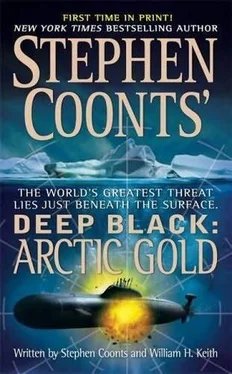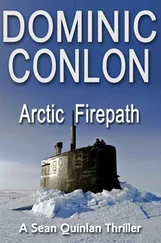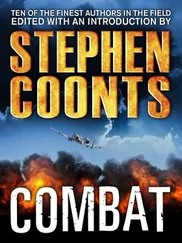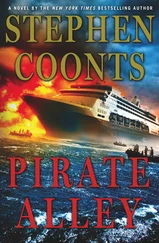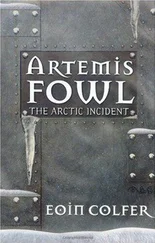Especially if the opposition managed to shoot the plane down.
As for the pilot hanging it all out for God and country at the top of the world… well, Charlie Dean thought, these Art Room chess players were pretty focused on the big picture. If the pilot got bagged, they would cry tomorrow. Or perhaps next week.
Ghost Blue Two miles northeast of Ostrov Kotlin 0059 hours
Major Delallo waited until the missiles were trailing him. He was passing fifty-eight thousand feet, now, but the trio of Guidelines was closing faster than he could climb. It was going to be damned close.
Past fifty-nine thousand feet. The missiles were five miles below him, still coming strong at three times the speed of sound.
Delallo had a tactical choice. He could keep climbing, hoping to get above the SAMs’ operational ceiling, and hope to hell the Russians hadn’t packed a surprise into those three birds, like some extra altitude. Or he could turn into the missiles and try to force an overshoot. The good news was that his F-22 was much more maneuverable than the missiles.
A major factor was those two MiG-31s back there. They were climbing, too, and coming fast. The MiG-31 Foxhound was the best interceptor in the Russian arsenal, and it could both outclimb and outrun the F-22. It would not be a good idea to let them get too close.
Delallo gauged the right moment, then popped chaff, hauling around on the stick and vectoring his engines sharply in a grueling, high-G Herbst maneuver.
The Herbst maneuver-also known as the J-turn-was only possible for high-performance aircraft like the Raptor. You needed post-stall technology, meaning vectored thrust engines and advanced computer-operated flight controls to manage a high enough angle of attack to pull it off. As he brought his nose around and down, his velocity fell off dramatically. The missiles were closing quickly-he could see their exhaust plumes out of the corners of his eyes as he concentrated on flying his plane.
An alarm sounded as he went into a stall; only his vectored thrust engines, delicately handled in sharp, precise movements, kept him properly oriented. In seconds he had the aircraft on a new flight path, down and into the missiles, which were about sixty degrees off his nose. He was forcing them into a maximum rate turn, a maneuver he knew he could win. Accelerating now at full throttle and assisted by the relentless pull of gravity, he was past the first Guideline before it could even begin to alter course… then past the second, then the third. All three had failed to hack the turn.
Now he eased off the throttles and made a gentle turn back toward his original heading, still descending and accelerating past Mach 2.
Grunting hard against the savage, crushing pressure of the G-load, Dick Delallo automatically swept his eyes over the threat indicator panel. It was blank.
So he was surprised when a missile he had neither seen nor known was tracking him exploded twenty feet below his right wing. Surprised? It was the shock of his life. After the flash and thump that rocked the plane, the surprise was that he was still alive.
Operation Magpie Waterfront, St. Petersburg 0059 hours
A BRIGHT, SILENT, SMALL FLASH briefly flared in the western sky, somewhere above the fog, but no one on the ground saw it.
The guard was deep into his perusal of Akulinin’s papers. Akulinin had the feeling that these guys weren’t exactly the MVD’s finest. More like armed postal clerks, trying to decide if he needed more stamps.
“You need pay special tax,” the guard said, waving Akulinin’s Russian visa.
As if that were news! “Okay, okay,” Akulinin said. “ Skol’ka? How much?”
The two guards exchanged a glance; Akulinin could see the avaricious smiles shielded behind their eyes. “Eight hundred rubles,” the first said.
Akulinin nodded. “I can take care of that.” He reached for his billfold.
“No,” one of the guards said, gesturing with his AKM. “You come with us. Pay at-what is word? At office.”
“Listen, Ivan,” Akulinin said, throwing some swagger into his voice and manner. “Our papers are fine. You’re just trying to shake us down for a little vzyatka, am I right?” He deliberately mispronounced the word, which was Russian for “bribe.”
The guards’ faces hardened. “You come.” There was no mistaking the threat behind the words. “Now!”
The Art Room NSA Headquarters Fort Meade, Maryland 1659 hours EDT
“I’m hit!” Ghost Blue’s voice called. “I’m hit!”
Dean stared at the flashing icon marking a point just north of Kotlin Island in the Gulf of Finland, the coffee in his mug forgotten. He could hear the ragged edge of stress in the pilot’s voice.
The controllers in the Art Room, all of them, remained silent. Dean could almost feel the oppressive sense of helplessness as the drama played itself out on the other side of the world.
“Damn it,” Sarah Cassidy said from a nearby console. “I told them they should use F-47s!”
Dean said nothing. Like every other branch of the American intelligence community, the National Security Agency had for years been working toward what Dean considered to be an impossible goal-the ability to conduct operations with a complete lack of risk for human operators. Spy satellites, remote sensors, unmanned aerial and submarine drones-billions of dollars had been spent over the past few decades to reduce the possibility of human casualties to zero.
The same mentality had haunted the Pentagon for decades now as well. Was it possible to fight a war relying solely on robotic weaponry, smart bombs, and invisible aircraft, to win a war without the images of body bags on the nightly news to remind the people at home that victory always came at a price?
Within the intelligence community, the list of serious intelligence failures over the past few years only emphasized the fact that all the spysats in orbit couldn’t provide the same depth and detail of data as a single well-placed human agent, HUMINT as opposed to SIGINT.
That, in fact, had been a large part of the philosophy behind the creation of Desk Three. The NSA was the principal agency responsible for America’s SIGINT capabilities, but there were times when you needed people on the ground, down and dirty.
Or, in this case, in an F-22 Raptor above the icy waters of the Gulf of Finland.
“Okay… okay, I’ve got it…,” the voice said over the speaker. Dean could hear the whoop and buzz of alarms in the background. “Starboard engine’s out, but I’ve still got control. Heading for Waypoint Tango Bravo.”
“Ghost Blue, Haunted House,” Rockman said, touching a microphone transmit switch. “Be advised that there are two, repeat, two targets closing on you. Probable Foxhounds. Over.”
“Yeah, I got ’em on the gadget. I’ll be over international waters before they catch me.”
“Copy that. Good luck, Ghost Blue.”
The answer was unintelligible.
“Sir!” Cassidy called out. “We’ve lost Magpie’s signal!”
Ghost Blue had been relaying radio communications from the Magpie team but must have now moved out of range.
“That’s okay,” Rubens replied from another console down the line. “We’re getting their signal through Mercutio and the safe house.”
“Who’s Mercutio?” Dean asked, joining Rubens.
Rubens looked up at Dean, then back to the big display. “One of our agents,” Rubens said with cryptic understatement. “He’s in charge of the backup team for Magpie.”
“Where the hell are they, anyway?”
Читать дальше
